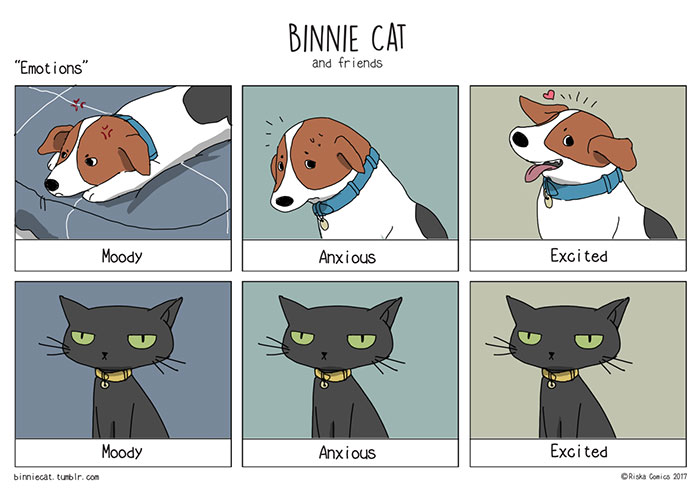It is really as simple as predator vs prey. Dogs are purely predators. They follow directions from pack members while hunting and show clear body language because that is how they communicate as a pack. Cats, on the other hand, are both predator and prey. As prey cats are wary, they’re going to assume that there’s a reason to be scared. They go to fight or flight first, stop and assess the situation second. Dogs are more likely to first check out the situation first and see what the scene is, whereas cats are going to slink around the edges and give themselves a way to escape. Cats do hunt, but they’re also going to be wary of what’s happening. Cats are solitary hunters, and because of that they don’t have the same overt body language and communication that dogs have to let the other members of their pack know what they are thinking. With that said cats body language can be understood, it is just much more subtle than dogs.

We have to view cats and dogs in totally different lights when we’re working with them and training them because of the differences in their status as prey or predator. Cats are not trying to be elusive or secretive or spiteful. They are doing what their biology tells them will keep them safe. Any use of punishment techniques with a cat will terrify them and they are gonna assume that you are not safe.
That is why positive reinforcement is so important in working with cats. It increases your bond with your cat and gives them confidence that the environment they live in is safe. It gives them a reason to want to work with you and a reason to not fear you. Any animal that lives in a state of fear or stress will start to show that fear and stress on the outside. For cats that may be urinating outside the litterbox, spraying, or destructive scratching. Using positive reinforcement training you can learn to communicate with your cat before any of these behaviors happen. And in solving any stress or fear issues, positive reinforcement can help your cat to relax and learn to bond with you and gain confidence in their environment.
